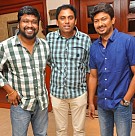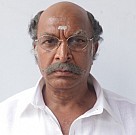“VIJAY INNOVATED VANGANNA VANAKKANGANNA” - SHRIHARI AND JEHOVAHSON ALGHAR
Interview Team : SudharshanCinema is a collaborative business and a massive one. No one man can make a cinema. Every smallest job must be performed meticulously to achieve a great cinema. Every department demands specialists to do that. In this interview, we take you through the lives of two such specialists.
V Shrihari and Jehovahson Alghar – Well known sound engineers, who have been a part of multitudinous super hit music albums. Their filmography boasts of big names like Thalaivaa, Raja Rani, Ugly, Thaandavam, Aadukalam, Joker, Aayirathil Oruvan and more
The strongest players of GV Prakash’s team that they are, V Shrihari and Jehovahson Alghar (aka JO) share their experiences, passion, journey, dream and the wish that has been in the minds of all the audio engineers in the country. Read on…
PHOTOS & STILLS - GALLERY
The beginning of the journey…
Shrihari: GV and I have been friends for more than 15 years. We had a band back then, called Samarpan. He played Keyboard and I, drums. We would’ve played for a thousand marriages together (laughs). Music brought us together and it still keeps us together. GV has always had plans of venturing into cinema and he used to ask me to join him. I wasn’t very keen about coming into the industry. But we continued to do a lot of live gigs and concerts.
Later GV did his sound engineering and started working on jingles. By that time I had moved onto a completely different stream. I was doing my mechanical engineering in VIT. But nothing worked out. My heart was here.
That’s when GV got his opening in movies and he asked me if I can be his sound engineer. That’s how the journey began.
After Veyyil, I took a break and went to Canada to do my studies on Sound Designing for Visual Media. After that I came back and rejoined GV. We’ve been working together since.
JO: I’ve been working since I was 18. My brother was a musician and I used to assist him. Later I got an opportunity in Mumbai, to work with Ranjit Barot. I was never away from my family until then. I was home sick and had to return. GV and I worked as a programmer and sound engineer respectively in an album long back. That’s how we met. When I came to know that he has started to work on films, I joined him.
GV and I have been friends for more than 15 years.
What we do…
Jo: We both complement each other well. We know our duties and don’t interfere with each other. He does the songs and I work on the background scores. In fact the ambience here will be like a bunch of friends doing something fun together.
Shrihari: That’s something we love about being here. None of us were hired. We all jumped into it together without even knowing what we were all capable of. When we began our first film, we knew very little and yet I left my engineering for good. We jumped into the industry assuming it’d work and it kind of did.
We all jumped into it the industry together without even knowing what we were all capable of.
How things work…
Shrihari: Basically I take care of the structure of the song. GV prepares a scratch tune. Then we get the lyricist to work on the lines. The following processes are orchestration and music arrangement. This is the work of a music producer, which is me.
GV appreciates our inputs while making a song and he gives us the freedom to express our views and ideas. At the same time he is very particular about the quality of the songs. If he isn’t happy with something, he doesn’t think twice about rejecting it. Since we’ve been working together for so long, we know how each one of us think and we do think alike, I’ve to say. That’s what long associations can do.
Once the production of the song is complete, we proceed with the final mixing. Then I separately lay out the song and do the stereo mixing.
We do not work on deadlines and directors don’t have a problem with that. But the same doesn’t happen in Jo’s case. He works on the background scores and since it is the process that happens close to the release of the movie, he always has deadlines to meet.
GV is very particular about the quality of the songs.
Exploring every genre…
Jo: One good thing about working with GV is that there’s not a single genre we haven’t tried. We are driven by passion. Forget about perfecting, we have at least tried our hands with pretty much everything and have done a good job at it.
Shrihari: For instance, Veyyil is a rustic album, Aayirathil Oruvan is an intense one, Madrasapattinam is more classical, Raja Rani is a fresh new age album and the best for the last, Ugly is something we have never attempted before.
We are driven by passion.
The next level…
Shrihari: We prefer doing all our work. No one understands our music better than us. Hence we don’t hire. Personally, although I’ve been into music for a long time, sound designing has been my area of specialization.
Now with Pencil, Jo and I are trying to allocate some time and engage into audiography full time. We have a bigger team now and all we have to do is to supervise them. So we believe we are ready to work on bigger projects.
JO: Also, we weren’t very good with managing our time. We used to keep working continuously for days. Now, we’ve learnt the knack of it and we can allot time to anything we want. That in fact is the idea behind taking up Pencil.
No one understands our music better than us.
Working with Anurag Kashyap…
If you are asking me about the difference in the working styles of the two industries, I’d say nothing much.
Are you open to working with other composers?
How do the directors describe their demands?
Jo: We are eagerly waiting for its release. It is something you would have never heard or expected from GV. It’s a whacky album.
GV sat down and came up with this seriously stunning album
The work patterns of Selvaraghavan, Vetri Maaran and Vijay…
Shrihari: For example, Selvaraghavan usually comes during the evenings. We then lock on the tune, Selva himself would write the lyrics and we’ll start the work by 9 pm, bring the singers and the track would be ready for the final mix by 2 am. We did Naan Sonnadhum Mazha Vandhucha in four hours. That’s how they work. Selva would spend a night here and return with at least two songs the next day morning.
Vetri Maaran is also a night bird. He’ll generally come by 7 pm and works until 1 am.
Director Vijay gets the work done via Skype. For Thaandavam, he got the tunes done from London. He knows our style and would make sure he shoots enough footage, just in case we decide to add something later on. Vijay expects a lot of Drama in the songs. He’d want every song to have a story. Whereas, Selva prefers intense tunes mixed with a pinch of fun element.
Vijay gets the work done via Skype.
Vijay and his Vanganna Vanakkanganna
A few days after the recording he visited us. He very well knows he has done a splendid job… Yet he’d say, “Feel free to replace my voice if you are not sure.”
Jo: He came again one day and said he’s not happy with a couple of dialogues. He did it once more. A perfectionist!
Vijay asked for the tune 20 days before the recording and came back having perfected the song.
Dolby Atmos and Auro 3D…
For so long we have been struggling to create real sound. Now we have the infrastructure to do so. Both Auro 3D and Dolby Atmos have the capability to create an authentic ambience. So why not use them?
For example, imagine you are listening to the stereo version of a song. That means you are experiencing only 10% of the real song. But, these technologies help us experience the authentic sound. With the help of these advancements you’ll feel as if you are in a live concert, where the instruments are around you. You’ll be able to experience the sound of each and every instrument used in the song and the source of the sound too.
Recognition…
Shrihari: Up west, awards like Grammy recognize engineers for every genre of music. There are so many brilliant techies in our country and it’s high time the deserved are honored.
I don’t want to sound too rebellious, but the problem sometimes is, the makers come to us at the brink of the hour and ask us to mix the movie in a week or even less.
But if they decide to give it a good 2 months, they go to a Hollywood studio and do the mixing. We have spectacular talents here and the same quality of work the makers are looking for at the Hollywood studios can be achieved here.
JO: Our point is, we don’t work for awards, but it’d be nice if we are equally recognized. In any case, nothing is going to change the way we work. We put in our fullest to every song and background scores and we’ll keep doing it.
We don’t work for awards...
FACEBOOK COMMENTS
OTHER LATEST INTERVIEWS
EDITOR SHRIHARI RELATED NEWS
- GV Prakash caught between Trisha and Nayanthara
- Dhanush and Vetri Maaran's next starts today!
- Promising composers line up for GV Prakash
- Ilayathalapathy to mark GV Prakash’s landmark?
- Ghibran’s brother goes with GV Prakash
- Anjaan and Pencil are the first in India…
- The reason behind casting GV Prakash as the hero...
- "Atlee signed me first" - G.V.Prakash
- ''Wishing my better half a happy birthday''
- GV Prakash intends to club Soodhu Kavvum and Selvaraghavan
- Madha Yaanai Koottam now has a certificate
- Pencil on Rajinikanth's birthday
- GV Prakash picks Christmas to begin
- “We are doing this for Vijay”- GV Prakash
- Nimirndhu Nil, Ugly and Kaakka Muttai followed by Irumbu Kuthirai
EDITOR SHRIHARI RELATED LINKS
- Raja Rani Telugu Success Meet
- Superstar Rajinikanth Launches Naan Sigappu Manithan Audio
- Naan Sigappu Manithan Audio Launch
- Naan Sigappu Manithan Audio Launch
- Nimirndhu Nil I II III IV V VI VII VIII
- Nimirndhu Nil I II III IV V VI VII
- Nee Enna Pesuvai - Cheran's Fest 2013
- GV Prakash at Graamatthu Ponnu Album Launch
- 4. GV Prakash | TOP 15 MUSIC DIRECTORS IN TAMIL - Slideshow
- Nimirndhu Nil Audio Launch
- Nimirndhu Nil Audio Launch
- GV Prakash | Ajith's 25 and Vijay's surprise - Top 10 News - Slideshow
- Stars grace BREW Awards
- Brew Awards
- Madha Yaanai Koottam Music Review
















